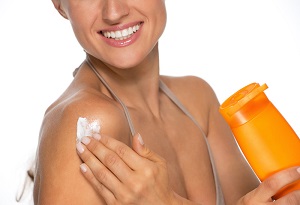 The skin, regardless of tone or colour will react when exposed to the sun’s rays repeatedly. This reaction can be in the form of tough, leathery skin or wrinkles just to name a few. The bottom line is, by the time you are just past middle aged, your skin will be wrinkled and rough looking if not properly cared for. The number one thing you must protect your skin from is the sun. The easiest way to avoid damage from the sun would be to avoid the sun entirely, but that is not feasible.
The skin, regardless of tone or colour will react when exposed to the sun’s rays repeatedly. This reaction can be in the form of tough, leathery skin or wrinkles just to name a few. The bottom line is, by the time you are just past middle aged, your skin will be wrinkled and rough looking if not properly cared for. The number one thing you must protect your skin from is the sun. The easiest way to avoid damage from the sun would be to avoid the sun entirely, but that is not feasible.
Protection from sun exposure is the best way to keep your skin looking great and healthy. The easiest protection for your skin is a sun block with some degree of UV protection. The UV protection is generally measured as an SPF concentration.
SPF stands simply for Sun Protection Factor. Sun block products will have this listed as a number on the label. Sunscreen can protect you from UVA or UVB sunrays; UVB rays are the ones that cause your skin to burn. Your best protection is an SPF sunscreen that will protect you from both types of UV rays.
SPF Number is the actual measurement of the time the product will protect your skin from turning red versus the amount of time with no protection on your skin at all. In other words, it gives you an indication of how long you can remain in the sun with protection when compared to your time in the sun without protection. SPF numbers range from a low of 2 to a high of 60 or sometimes higher. For example, if you would begin to burn after 20 minutes exposure, when you apply a sunscreen with an SPF 15 to your skin you can stay out in the sun for 15 times longer. The SPF number listed on sunscreen bottles only tells you the level of protection against the UVB rays and not the UVA rays which cause aging in the skin. Be weary of labels and make sure the bottle states you are protected against both rays. Labeling regulations will be changing in the next year to make it more clear on the level of protection against both UVA and UVB.
The SPF rating that is right for you will depend a lot on the type of skin you have. Young children 6+ months should wear an SPF of 15 or higher to protect against both sun tanning and burning. Very Fair skin generally burns quickly and tanning is rare. Consider sunscreen products that contain a SPF of 20 to 30. Fair skin types can get away with an SPF of 12 to 20. Light skin burns in the moderate range. Tanning is normally gradual, yielding a light brown shade. An SPF of 8 to 12 would be appropriate. Medium skin tones burn in the minimal range and tanning happens much of the time requiring an SPF of 4 to 8. Dark skin rarely burns and an SPF of 2 to 4 would be sufficient. No matter your skin tone sunscreen is always recommended when spending prolonged periods of time outside, even on cloudy days.
All that being said, it is extremely important to remember to reapply constantly. Time, water and sweat all lead to sun block losing its effectiveness. It is also important to know that use of sun block with SPF does not protect us from harmful rays getting through to damage the skin. Just because your skin is not burning, doesn’t mean that you are not still causing damage to your skin. Adding additional pieces of clothing such as wide brimmed hats, SPF clothing, staying in the shade or using an umbrella will also help protect your skin.
For more articles go to http://clubonefitness.lifestyleezine.com

 The healthy look of our skin and hair is directly related how healthy we are on the inside. Many of the healthy foods that we eat can also provide excellent benefits to the skin and hair. Diet plays a big role in maintaining healthy skin and hair. Your diet needs to have the proper protein, fats, carbohydrates, essential fatty acids, and vitamins and minerals. Foods containing omega 3s are key to healthy skin and hair.
The healthy look of our skin and hair is directly related how healthy we are on the inside. Many of the healthy foods that we eat can also provide excellent benefits to the skin and hair. Diet plays a big role in maintaining healthy skin and hair. Your diet needs to have the proper protein, fats, carbohydrates, essential fatty acids, and vitamins and minerals. Foods containing omega 3s are key to healthy skin and hair.